President of India Ram Nath Kovind: Biography, Early Life & Career
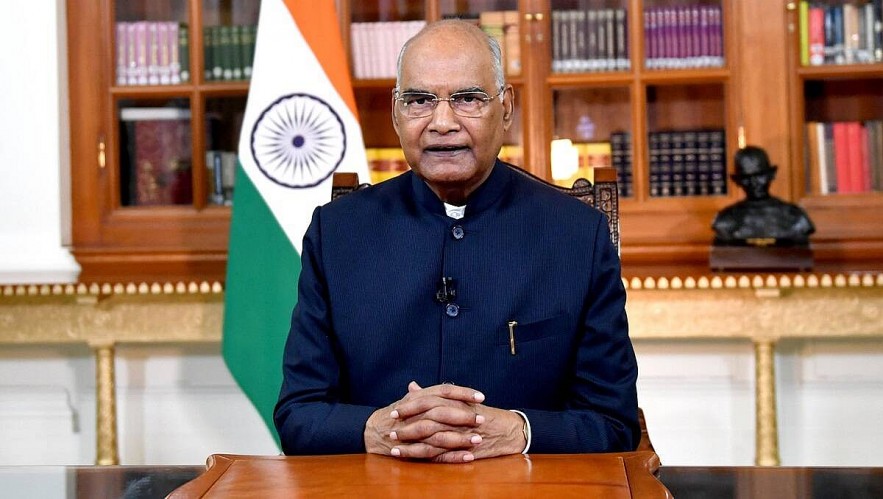 |
| Photo: The Indian Express |
Early life and Education
Shri Kovind was born on 1st October 1945 at village Paraunkh in Kanpur district of the State of Uttar Pradesh, India. Coming from a family of modest means, his beginning was humble, according to his own website.
After earning degrees in commerce and law from Kanpur University, he moved to Delhi in order to take the civil services examination. Although he passed, Kovind chose to begin practicing law and was admitted to the bar in 1971.
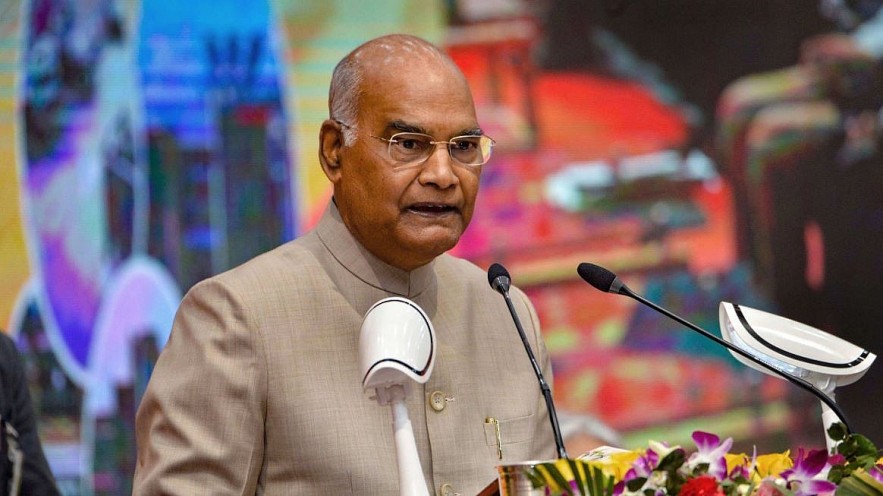 |
| Photo: Hindustan Times |
Professional career
Kovind worked in the Delhi Free Legal Aid Society, and he also served (1971–75, 1981) as general secretary of the Akhil Bharatiya Koli Samaj, an organization serving the interests of the Koli community, a Dalit subcaste. From 1977 to 1979 he was a union government advocate in the Delhi High Court, and in 1978 he became an advocate-on-record of India’s Supreme Court. In 1980 Kovind advanced to the position of union government standing counsel in the Supreme Court, and he practiced there until 1993. In addition, he served (1977–78) as the executive assistant to Prime Minister Morarji Desai.
In 1991, Kovind joined the BJP, and three years later he was elected to the Rajya Sabha (the upper house of India’s parliament) from Uttar Pradesh. During his 12 years in that body, he served on various committees, including those on law and justice, social justice and empowerment, and welfare of Scheduled Castes and Scheduled Tribes. He was part of the Indian delegation to the United Nations and spoke before the General Assembly in 2002. In 2015 Kovind was appointed governor of the state of Bihar. His non-confrontational approach to political problems earned him praise across the political spectrum. Among his notable achievements as governor was the creation of a judicial commission to investigate corruption in universities, according to Britannica.
In June 2017 the BJP announced Kovind as the party’s candidate to succeed Pranab Mukherjee in the ceremonial office of president. He faced Meira Kumar, former speaker of the Lok Sabha (the lower house), and herself a Dalit. In spite of the fact that his low-key profile made him relatively unknown, he won nearly two-thirds of the vote.
Kovind was sworn in as India’s 14th president in July 2017. Through the promulgation of presidential orders in August 2019, he was instrumental in the revocation of the autonomy of Jammu and Kashmir state (now Jammu and Kashmir union territory and Ladakh union territory).
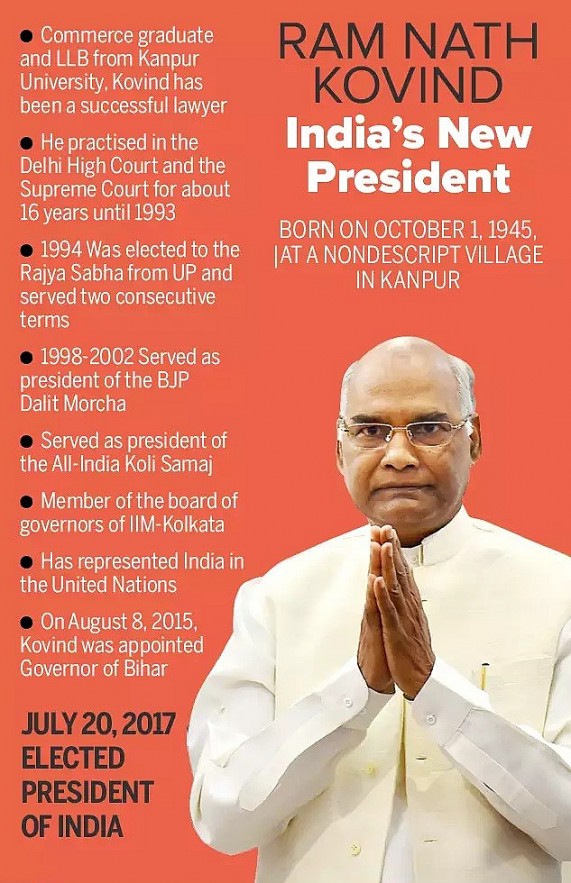 |
| Photo: Times of India |
Public life and Parliament
Shri Kovind was elected as a member of the Rajya Sabha, the Upper House of Parliament, from Uttar Pradesh effective from April 1994. He served two consecutive terms of six years each till March 2006. Serving on numerous Parliamentary Committees, he gathered in-depth experience in governance. He addressed the United Nations General Assembly on 22 October 2003 as a member of the Indian delegation.
Shri Kovind is an ardent advocate of education as a tool for social empowerment. He actively supports the greater participation of women in nation-building and has been consistently calling for society to create more opportunities for the deprived sections, especially the disabled and the orphans. He served as a Member of the Board of Management of the Dr. B. R. Ambedkar University, Lucknow, and also as a Member of the Board of Governors of the Indian Institute of Management, Kolkata.
President Kovind’s vision is to contribute towards "creating that optimal partnership between citizens and their representatives in the Government”.
Shri Kovind was appointed Governor of the State of Bihar on 8 August 2015. His term as Governor received all-around appreciation for upholding the values of the Constitution. He, in his capacity as Chancellor, introduced several reforms and modern technology in the working of State Universities and brought transparency in the appointment of Vice-Chancellors. He earned respect from leaders of all political parties for his statesmanship, sagacity, and adherence to democratic ethos.
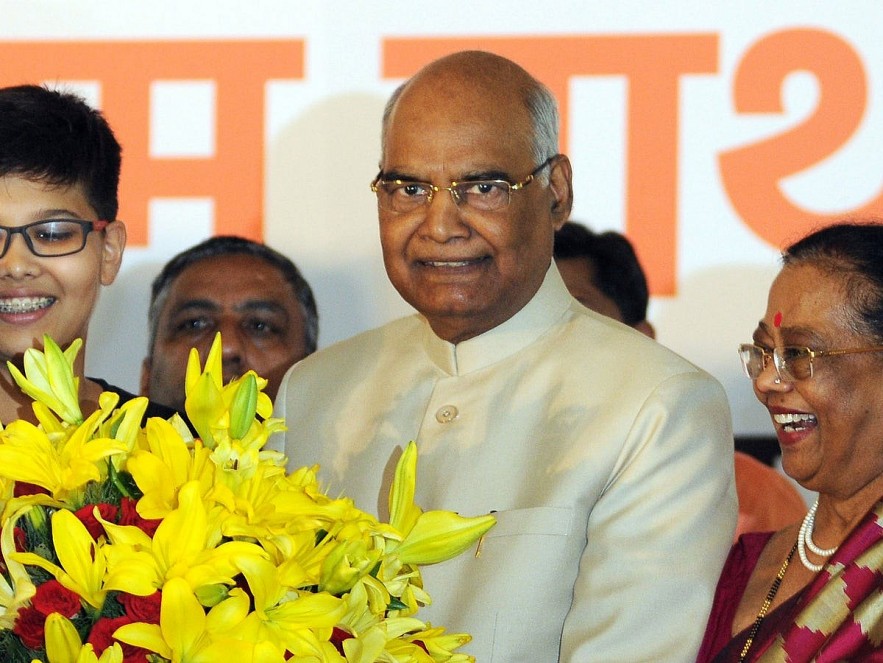 |
| Photo: The Independent |
Indian President's Terms of Office and Powers
Article 56 of the Indian Constitution says that the President shall hold office for a term of five years from the date he takes up his post. The President of India is vested with the Executive, Legislative, Emergency, Diplomatic, Judicial, and Military powers, according to Elections in India.
Executive: All the executive powers of the Union shall be vested in him. These powers should be exercised by him in accordance with the Constitution of India. He appoints the Prime Minister and the Council of Ministers. He also appoints the judges of the Supreme Court and the High Courts in the states, besides appointing the Attorney General and Comptroller and Auditor General of India. Among other critical powers, he enjoys the pardoning power, whereby he can pardon the death sentence awarded to a convict.
Legislative: He can dissolve the Lok Sabha and end a session of the Parliament. He can also address the Parliament in its first session every year. He can nominate 12 members to the Rajya Sabha. These members must have extraordinary accomplishments in the fields of science, art, literature, and social service. He can also nominate 2 members to the Lok Sabha from the Anglo-Indian Community. When a bill is passed by the Parliament, the President can give or withhold his assent to it. He can also return it to the Parliament unless it's a Money Bill or a Constitutional Amendment Bill.
Emergency: He can declare national, state, and financial emergencies. A national emergency can be declared on the grounds of war, external aggression, or armed rebellion in the country. This can be done at the written request of the Cabinet Ministers after the proclamation has been approved by the Parliament. State emergency can be imposed in a state if it fails to run constitutionally. A financial emergency can be proclaimed if there is a likelihood of financial instability in the country.
Financial: Only when the President recommends can a money bill be introduced in the Parliament. He lays the Union budget before the Parliament and makes advances out of the Contingency Fund.
Diplomatic, Military, and Judicial: He appoints ambassadors and high commissioners to other countries. All international treaties are signed on his behalf. Under Military powers, he can declare war and conclude peace. He appoints Chief of Army, Navy, and Air Force. He can dismiss judges if two-thirds majority of the members present of the two Houses of the Parliament pass the resolution to that effect.
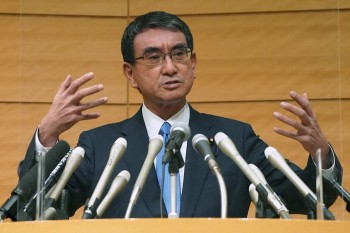 | Who is Taro Kono - Politician Who Could Become Japan's Next Prime Minister? Japan's popular minister of administrative affairs, Taro Kono, formally announced his candidacy to lead the ruling Liberal Democratic Party (LDP) and become the next prime ... |
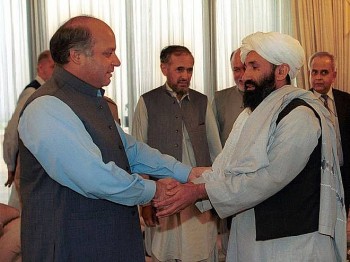 | Who is Mullah Hasan Akhund - Afghanistan Interim Prime Minister? The Taliban announced on September 7 that Mullah Hasan Akhund has been appointed interim prime minister of Afghanistan. Who is Mullah Hasan Akhund and what ... |
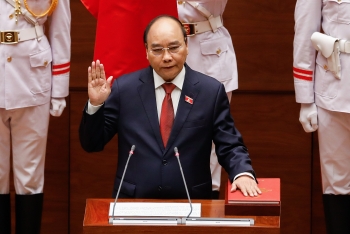 | Biography of new State President of Vietnam Nguyen Xuan Phuc Politburo member Nguyen Xuan Phuc has been elected President of the Socialist Republic of Vietnam during the current 11th session of the 14th National Assembly ... |
Recommended
 World
World
India strikes back at terrorists with Operation Sindoor
 World
World
India sending Holy Relics of Lord Buddha to Vietnam a special gesture, has generated tremendous spiritual faith: Kiren Rijiju
 World
World
Why the India-US Sonobuoy Co-Production Agreement Matters
 World
World
Vietnam’s 50-year Reunification Celebration Garners Argentine Press’s Attention
 World
World
"Will continue offering our full support to Indian govt": US FBI Director after Pahalgam attack
 World
World
"Great Leader": JD Vance Lauds PM Modi During His India Visit
 World
World
Trump’s Tariff Pause: A Strategic Move from “The Art of the Deal”?
 World
World

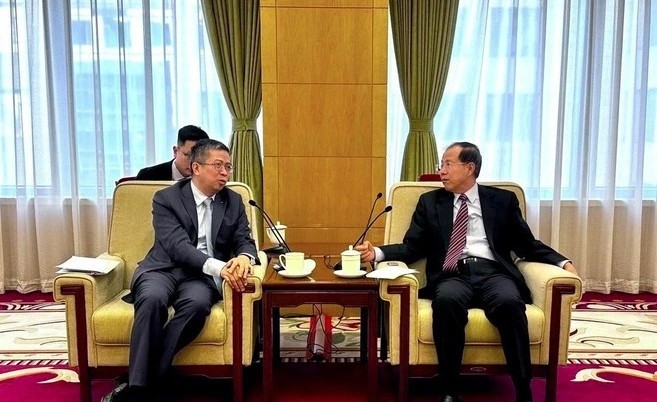
![[Photos] India and Vietnam Unite in Friendship Festival 2024](https://vietnamtimes.org.vn/stores/news_dataimages/2024/122024/19/23/b72443a0d3e09c7d133e23a7d221ca07.jpg?rt=20241219234711)